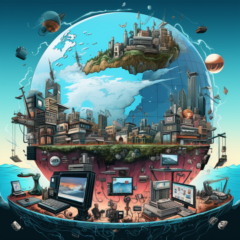
- The Evolution of Learning: From Degrees to Just-in-Time Knowledge
- The Childlike Curiosity: Learning Something New Every Day
- Learning from Diverse Sources: Mentors, Books, and Online Platforms
- Building a Personal Learning Highway
- Become a Lifelong Learner
- The Parable of the Lifelong Learner
- The Endless Journey of Growth: No Fixed Destination
- Conclusion: Lifelong Learning as an Opportunity, Not a Chore
The Evolution of Learning: From Degrees to Just-in-Time Knowledge
In today’s rapidly evolving world, the traditional approach to education, characterized by a linear trajectory of learning, working, and then retiring, is becoming increasingly obsolete. The concept of lifelong learning emerges as a vital tool for adapting to continuous change. This transformation is evident in the shift from traditional degree programs to more dynamic, flexible forms of learning such as nano degrees, online platforms like Udemy, and the vast resources available on YouTube. These options not only offer a cost-effective alternative to conventional degrees but also cater to the ‘just-in-time learning’ approach, allowing individuals to acquire specific skills as and when needed.
The Childlike Curiosity: Learning Something New Every Day
Lifelong learning is not just about formal education or skill acquisition; it’s about nurturing a mindset of perpetual curiosity and exploration, much like that of a child. This involves embracing the joy of learning something new every day, which not only enhances personal growth but also keeps us relevant in an ever-changing professional landscape.
Learning from Diverse Sources: Mentors, Books, and Online Platforms
The sources of knowledge in today’s world are diverse and abundant. Learning from mentors offers personalized guidance, books provide in-depth understanding, and online platforms like YouTube and Udemy bring a plethora of courses and tutorials right to our fingertips. This variety ensures that learning can be tailored to individual preferences and needs.
Building a Personal Learning Highway
Envision your learning journey as a network of highways and branch roads. The ‘motorways’ represent the core areas you wish to focus on or excel in, while the ‘branch roads’ are exploratory paths that could potentially develop into future core areas. This analogy helps in structuring learning goals and prioritizing areas of focus.
Become a Lifelong Learner
As we accept that the work world will constantly change, our knowledge and understanding must evolve accordingly.
What could help you?
- Setting continual learning goals
- conducting annual self-inventories
- developing transferable and self-management skills.
These practices not only align our work with our capabilities and goals but also enable us to adapt to the digital era’s demands.
The Parable of the Lifelong Learner
Once, in a vast forest, there lived two birds, Skylark and Sparrow. Skylark loved to soar high, exploring every corner of the forest, while Sparrow preferred to stay within the familiarity of her nest. One day, a great storm changed the landscape of the forest. Skylark, who had explored widely, easily found new sources of food and shelter. Sparrow, however, struggled, as her limited knowledge of the forest left her unprepared for change.
This parable illustrates the importance of lifelong learning. Like Skylark, those who continuously explore and learn can adapt quickly to changes, finding new opportunities even in challenging circumstances. In contrast, staying within a comfort zone, as Sparrow did, can lead to difficulties when the familiar world shifts.
The Endless Journey of Growth: No Fixed Destination
In the realm of personal and professional development, there is no final destination or endpoint. Growth is a perpetual journey, not a destination. This concept is vital in understanding lifelong learning.
Unlike traditional education, where there is a clear end goal (a degree, a certificate), lifelong learning is an unending process. It’s about continuously evolving, not just in response to external changes but also as a means of internal development.
This journey is unique for everyone, driven by individual interests, goals, and the ever-changing demands of the world around us. Embracing this ongoing journey means accepting that there will always be something new to learn, a new skill to master, or a new perspective to understand.
Conclusion: Lifelong Learning as an Opportunity, Not a Chore
Lifelong learning should not be viewed as a tedious obligation but as an exciting opportunity. The challenge lies not in finding something to learn but in choosing from the myriad of fascinating options available. In embracing lifelong learning, we open ourselves to endless possibilities for personal and professional growth, ensuring that we remain adaptable, skilled, and relevant in an ever-changing world.
